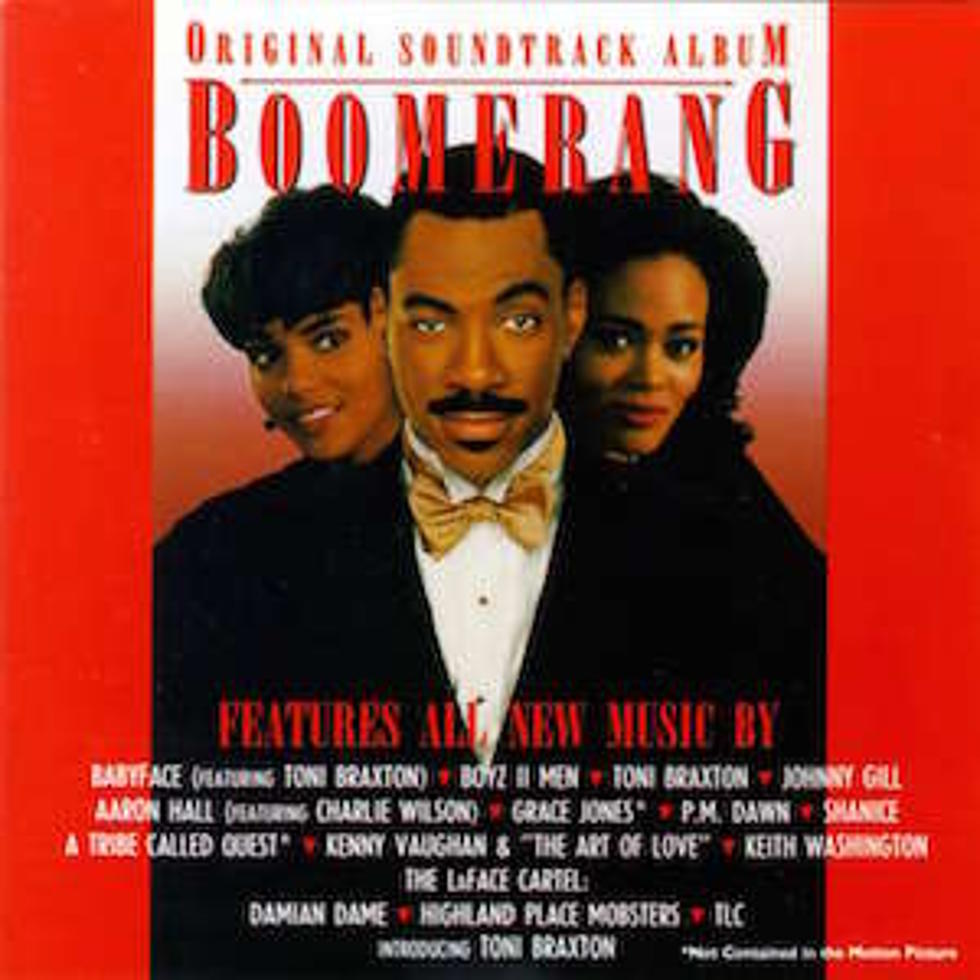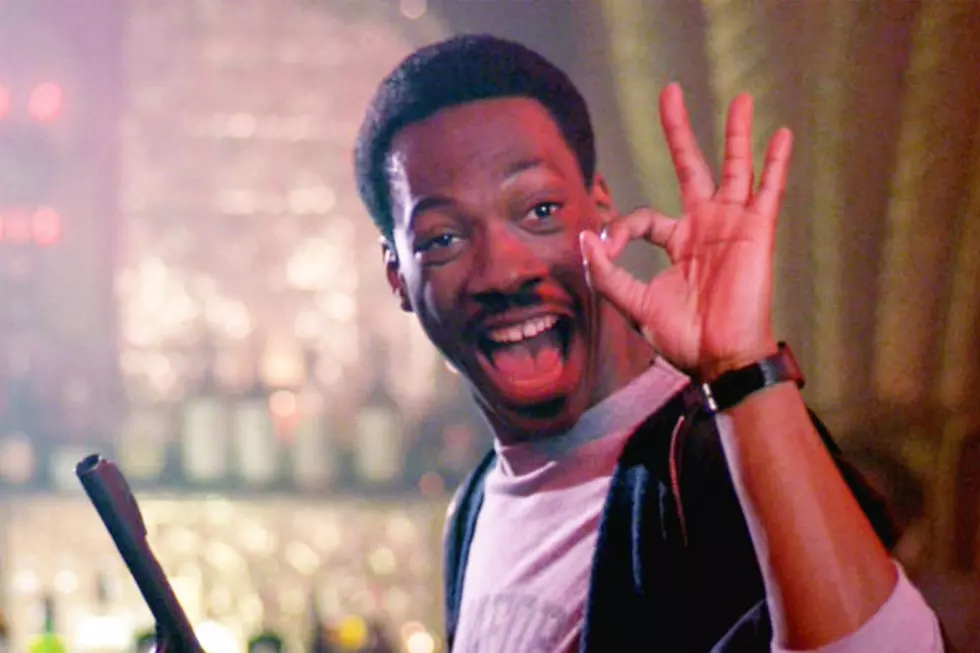
Love Shoulda Brought You Home: The Slick, Sophisticated R&B of the ‘Boomerang’ Soundtrack
1992 was a year of major transition in Black popular music. In hip-hop, the sound of Dr. Dre's G-funk was on the horizon; announced to the mainstream via Dre's single "Deep Cover" that April. And in R&B, the new jack swing era began to show signs that it was waning. The hip-hop-influenced production style had dominated radio airwaves since 1987, but in the summer of 1992, two major albums made it clear that change was coming. One was Mary J. Blige's debut album What's the 411?, which would be released that July. The other was the soundtrack to the Eddie Murphy romantic comedy Boomerang.
Antonio "L.A." Reid and Kenneth "Babyface" Edmonds had been a hit-making songwriting/production team since their days in 80s R&B group The Deele, and they'd cemented their reputations on a string of hit albums from Bobby Brown (Don't Be Cruel), Pebbles (Always), Whitney Houston (I'm Your Baby Tonight) and Johnny Gill (1990s Johnny Gill). The pair had founded their own record label, LaFace Records, in 1989 but had yet to really define LaFace as a brand--even as the sound of L.A. and Babyface was dominating urban radio.
That would begin to change in 1991, when LaFace signed their first act, the R&B duo Damian Dame (which consisted of the late Debra Hurd and the late Bruce "Damian" Broadus). Damian Dame would see moderate success with the single "Exclusivity" and shortly thereafter, LaFace introduced The Highland Place Mobsters, a new jack swing group fronted by producer Dallas Austin. But the label's most significant addition would come via L.A. Reid's wife Pebbles, who mentored and managed a fledgling group out of Atlanta called TLC. Consisting of Tionne "T-Boz" Watkins, Lisa "Left Eye" Lopes and late addition Rozonda "Chilli" Thomas (who was a former background singer/dancer for Damian Dame), TLC would be signed to LaFace and released their first single "Ain't 2 Proud 2 Beg" in late 1991. And in February 1992, LaFace released TLC's debut album Ooooooohhh... On the TLC Tip, which would go on to sell 2 million copies on the back of hit singles like "Baby, Baby, Baby," an L.A. and Babyface-penned mid-tempo track that became a No. 2 pop hit in the spring of 1992.
With the success of TLC, LaFace Records had it's first noisemaking triumph as a label. But L.A. and Babyface had something else brewing while their newly minted pop stars stormed the charts. The duo had been tapped to handle the soundtrack for a romantic comedy starring Eddie Murphy, Robin Givens and newcomer Halle Berry, and it could be another major home run for LaFace if the project did well. The hitmaking producers also had another new face waiting in the wings: a powerhouse 25-year old singer named Toni Braxton. L.A. and Babyface sought out Toni for their label after hearing her sing in the Braxtons, a quintet with Toni and her sisters (Traci, Towanda, Trina, and Tamar). L.A. and 'Face had written a ballad called "Love Shoulda Brought You Home" for the Murphy film, originally planning to give it to soul diva Anita Baker. Baker was pregnant and decided not to record the song--but suggested it be given to Braxton.
Braxton would record "...Brought You Home" and "Give You My Heart," a duet with Babyface, for the Boomerang soundtrack. And soon, the rest of the soundtrack began to fall into place. L.A. and Babyface had written four songs on Johnny Gill's multiplatinum 1990 self-titled album, and the balladeer was given the smoldering "There You Go" to contribute to the soundtrack. Singer/model/actress Grace Jones was featured in a major role in the film, and would collaborate with Austin and co-producer Randy Ran on the single "7 Day Weekend" for the soundtrack.
P.M. Dawn had been one of the breakout acts of 1991 following their smash single "Set Adrift On Memory Bliss," but the duo of DJ Minutemix and the late Prince Be had been the subject of criticism and parody from both hip-hop and pop fans for their esoteric lyrics and "hippie" image. The backlash would eventually come to a head with KRS-One famously interrupting P.M. Dawn's set at a December 1993 show and throwing frontman Prince Be offstage. But things had yet to go that far in the summer of 1992; P.M. Dawn were still quite popular, and the duo contributed the elegant piano ballad "I'd Die Without You" to the Boomerang soundtrack.
Guitarist Kenny Vaughan is featured alongside the Art of Love on the underrated "Feels Like Heaven," and Aaron Hall duets with his musical forefather Charlie Wilson on "It's Gonna Be Alright." The posse cut "Reversal of A Dog" gave LaFace an opportunity show off its roster of talent. Featuring TLC, Braxton, the Highland Place Mobsters and Damian Dame as "The LaFace Cartel," the song wasn't a single, but would be featured prominently in the movie and served as an announcement that LaFace had arrived as an important stable of talent in urban music.
The soundtrack's only hip-hop contribution comes from A Tribe Called Quest, who were still riding high on the critical and commercial success of their acclaimed sophomore album The Low End Theory. The quirky rappers from Queens delivered "Hot Sex," one of the album's most well-received singles--despite it not being included in the actual film. The video for "Hot Sex" would become the subject of one of hip-hop's most famous rumors--as Tribe frontman Q-Tip appeared in a ski mask to hide facial scars from what was attributed to a fight he'd been involved in with new jack swing rap act Wrecks-N-Effect.
The soundtrack's biggest hit would come from Boyz II Men's Babyface-written smash "End of the Road." One of the most successful singles of all time, the song--a heartsick ode to an unfaithful lover--would set the record for most weeks at number one on the Billboard Hot 100 (13 weeks) and was later ranked the sixth most successful song of the decade 1990–1999 by Billboard. The track helped Boyz II Men evolve into smooth adult contemporary balladeers following their early success as a new jack swing act, and along with "Love Shoulda Brought You Home," it cemented Babyface as the go-to hitmaker for sophisticated, slick and mature R&B.
"After watching the film, 'End of the Road' was one of the songs that I had started to write," Babyface would recall in an interview with Songwriter Universe earlier this year. "Then we did a demo of it, and we thought it would be a great idea to get Boyz II Men on it. So we sent the song to them, and they said, yes. So we ultimately went to Philadelphia, and we probably cut the song with them in three or four hours, because they were on the road and it was kind of in and out. At the time we did the song, it felt really great, but we had no idea that it was gonna do what it did."
Released June 30, 1992, the Boomerang soundtrack made it apparent that LaFace was a force, but it also confirmed that R&B was moving away from the dance-driven beats of new jack swing and more towards a lush, romantic ballad-heavy type of urban contemporary that would be embodied by artists beyond just Braxton and Boyz II Men, as acts like Shai, Brownstone, Chante Moore and Babyface himself also led the charge in coming years. While the hip-hop soul of Mary J. Blige and Jodeci remained anchored in the sort of streetwise edginess that new jack swing had introduced, the flip side of mainstream R&B reveled in the kind of sentimentality and slickness that had been the hallmark of 80s crooners like Luther Vandross and the aforementioned Baker.
And with the success of the Boomerang soundtrack--to the tune of 3 million copies sold and three major chart hits--LaFace became the centerpiece for the mainstream takeover of 1990s R&B and hip-hop. Acts like Usher and OutKast would follow TLC and Toni Braxton to the top of the charts and prove to be major successes for the house that Reid and Edmonds built, and the label would kickstart the emergence of Atlanta as a hotbed for black popular music.
The album stands as the perfect sonic backdrop for a romantic weekend or a lovely night at home, filled to the brim with melodies and production that sound as urbane and amorous as the popular movie itself. When people wax nostalgic about the merits of 1990s R&B--this is the sound they're talking about. It's remarkable that it came together so well for L.A. and Babyface. Even more remarkable that they were just getting started.
Watch the Video for Toni Braxton and Babyface's "Give You My Heart":
Watch the Video for P.M. Dawn's "I'd Die Without U":
Watch the Video for Boyz II Men's "End of the Road":
Watch the Video for Toni Braxton's "Love Shoulda Brought You Home":
More From KSSM-FM










